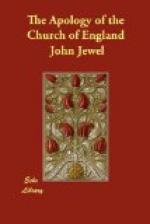ought not of right once to be called a bishop, or
so much as an elder. For a bishop, as saith
Augustine, is a name of labour, and not of honour:
because he will have that man understand himself to
be no bishop, which will seek to have pre-eminence,
and not to profit others. And that neither the
Pope, nor any other worldly creature can no more be
head of the whole Church, or a bishop over all, than
he can be the bridegroom, the light, the salvation,
and life of the Church. For the privileges and
names belong only to Christ, and be properly and only
fit for him alone. And that no Bishop of Rome
did ever suffer himself to be called by such a proud
name before Phocas the emperor’s time, who,
as we know, by killing his own sovereign Maurice the
emperor, did by a traitorous villainy aspire to the
empire about the six hundredth and thirteenth year
after Christ was born. Also the Council of Carthage
did circumspectly provide, that no bishop should be
called the highest bishop or chief priest. And
therefore, sithence the Bishop of Rome will nowadays
so be called, and challengeth unto himself an authority
that is none of his; besides that he doth plainly
contrary to the ancient councils, and contrary to the
old fathers; we believe that he doth give unto himself,
as it is written by his own companion Gregory, a presumptuous,
a profane, a sacrilegious, and an antichristian name:
that he is also the king of pride, that he is Lucifer,
which preferreth himself before his brethren:
that he hath forsaken the faith, and is the forerunner
of Antichrist.
Further we say, that the minister ought lawfully,
duly, and orderly to be preferred to that office of
the Church of God, and that no man hath power to wrest
himself into the holy ministry at his own pleasure
and list. Wherefore these persons do us the greater
wrong, which have nothing so common in their mouths,
as that we do nothing orderly and comely, but all
things troublesomely and without order; and that we
allow every man to be a priest, to be a teacher, and
to be an interpreter of the Scriptures.
Moreover, we say that Christ hath given to His ministers
power to bind, to loose, to open, to shut. And
that the office of loosing consisteth in this point:
that the minister should either offer by the preaching
of the Gospel the merits of Christ and full pardon,
to such as have lowly and contrite hearts, and do
unfeignedly repent themselves, pronouncing unto the
same a sure and undoubted forgiveness of their sins,
and hope of everlasting salvation: or else that
the same minister, when any have offended their brothers’
minds with a great offence, with a notable and open
fault, whereby they have, as it were, banished and
made themselves strangers from the common fellowship,
and from the body of Christ; then after perfect amendment
of such persons, doth reconcile them, and bring them
home again, and restore them to the company and unity
of the faithful. We say also, that the minister




